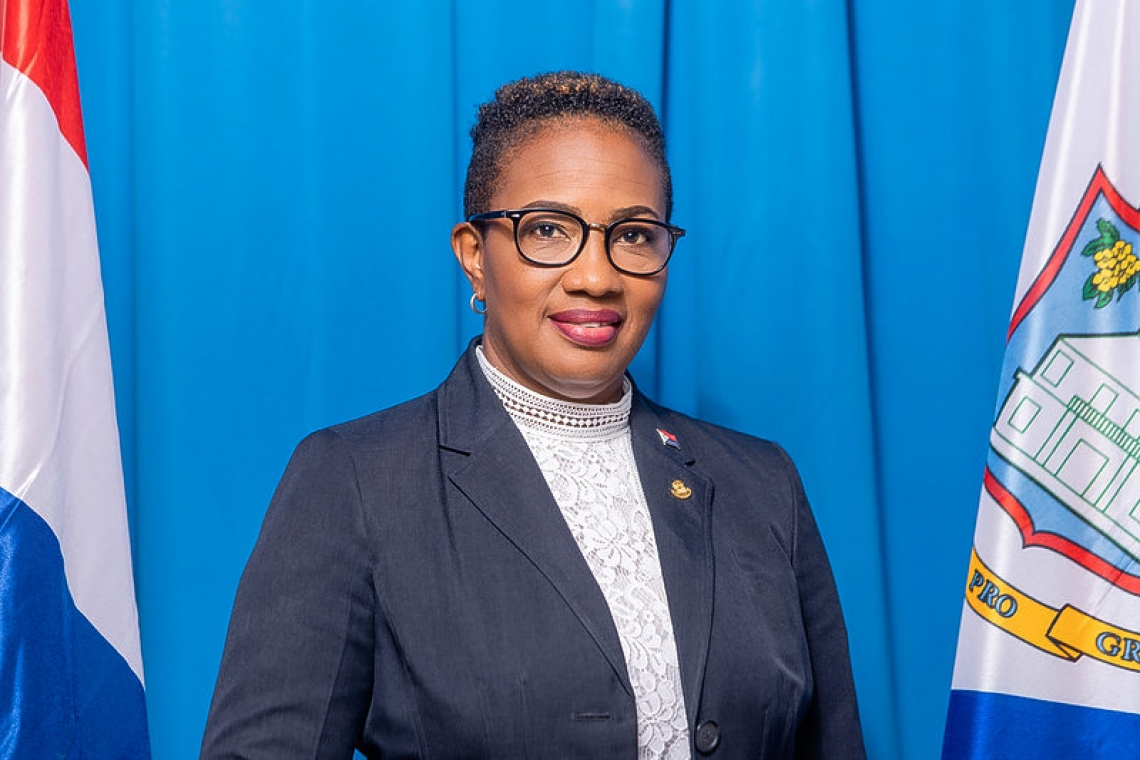PHILIPSBURG--Interim Prime Minister/Minister of General Affairs Silveria Jacobs says she is looking forward to open and transparent discussions with the unions and their representatives in the Committee Civil Servants Unions (CCSU) over the draft pension reform legislation.
Jacobs presented the legislation in Parliament last week and will be having further discussions with CCSU, formerly GOA, next week.
Jacobs said the unions had requested meetings previously; however, those meetings were not requested pertaining to the pension reform. She assured this would be discussed in that meeting. “As stated before, it is my goal to achieve the best possible outcome for the civil servants’ understanding [of – Ed.] the current status of our pension legislation,” Jacobs said.
“It is a very difficult moment to turn back, once the unions who were part of the discussions from the beginning have committed themselves to it and later see a problem,” Jacobs said. She said this information had been provided recently, the reason the unions did not “notice changes” had been made that were different from what was originally agreed on.
Jacobs said, “As the last in a long line of General Affairs Ministers dealing with this legislation, having served in Parliament and questioned why certain consultations had not been done, I expected that [this] had been [completed]. The organisation assured me that it had been done, but it still appears that the union is dissatisfied with the outcome of those meetings.
“What has been made clear to me, which was missed during my opening statements in Parliament, is that certain agreements [were] made in 2016 about the way forward. The GOA changed to CCSU and these unions together who represent workers in St. Maarten agreed on what the criteria would be, to be members of the CCSU.
“Membership required that you represented minimum 10 per cent of the organisation of civil servants, whether it’s police or other civil servants, and you had to be registered [with] the island police union. [Police union] Nationale Algemene Politie Bond (NAPB) St. Maarten and [civil servants union] ABVO were both Curaçao-based unions. The ABVO, in the meantime, has registered in St. Maarten and now has a local branch; however, the NAPB has not. So, it is still not a legitimate union to be a member of the CCSU.
“Due diligence has to be done by the unions and set the criteria; you are part of the group that set the criteria to protect St. Maarten workers and you require the union to have at least a 10 per cent representation.
“Then it is clear now that the unions that are stating that they’re not having a say within what CCSU has agreed to, are not actually in compliance and while they were allowed to go along in the discussions back then, it was clear that certain changes would have to be made and they will have do their due diligence.”
Jacobs appealed to the unions in question to “live up to those agreements.” She addressed civil servants represented by the unions, saying, “If you belong to a union with less than 10 per cent representation, then that is for you, the civil servant, to choose which union to represent you. The [union] that would have a say within the CCSU would be the one with more than 10 per cent representation.”
Jacobs said she is looking forward to open and transparent discussions with the unions and their representatives in the CCSU, individually if necessary. She reiterated that she will be having a formal meeting with CCSU next week.
In a response to Jacobs’ remarks, the NAPB union said a meeting had been held with the mediator last year to establish the legality of the unions representing workers in St. Maarten. “During that meeting on February 14, 2019, the treasurer of the NAPB handed over a copy of a registration form of the Chamber of Commerce to the mediator.”
NAPB insisted on the legitimacy of the union despite Jacobs’ remarks.
The union said that in June 2019, after being summoned by the justice committee to Parliament, then-Member of Parliament Jacobs was amazed “by why and how come the NAPB was not a member of the CCSU and found it completely unfair by the way the union had been treated by that specific policy advisor.” NAPB representatives shared their disbelief in the remarks made by Jacobs in her opening statement on Wednesday.
According to the union, NAPB was a member of the GOA as an observer from 2011 to 2016. From 2016 to 2018 NAPB functioned as a member of the GOA, formally the CCSU. The union said due to strict measures and qualifications implemented by the policy advisor for each union to be represented by the CCSU, the NAPB could no longer remain a member.
As stated by Jacobs, the union currently does not have the required 10 per cent representation of Police Force of St. Maarten KPSM workers needed to retain membership in the CCSU.
NAPB assured its members not to let the recent statements made by the interim Minister of General Affairs create fear. “The union is working with other stakeholders whereby a proof of registration is required,” NAPB representatives said.







